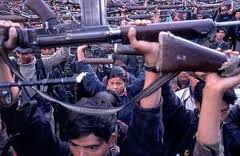NPA did not violate CARHRIHL in using landmine in Cagayan ambush*
Salvador del Pueblo
Fortunato Camus Command
NPA-Cagayan Valley
January 28, 2011
AFP officers again show absurd ignorance of international laws and protocols of war by incessantly harping on the NPA’s alleged violations of the use of landmines after the Danilo Ben Command-NPA ambushed PNP officers on January 23, 2011 in Rizal, Cagayan.
Killed in the ambush were Inspector Antonino Rueco, police chief of Rizal town; SPO2 Maryann Rueco, PO1 Erminio Rueco, PO2 Jose Baquiran and PO1 Joven Jimenez. Wounded was SPO4 Edison Lagua.
Philippine Army spokesman Col. Antonio Parlade and AFP spokesperson Brig. Gen. Jose Mabanta claim that the NPA violated the Comprehensive Agreement on the Respect for Human Rights and International Humanitarian Law (CAHRHRIHL) by using a command-detonated landmine in the said ambush. But the landmine used by NPA fighters were command-detonated explosives (CDX), and not pressure-triggered, to ensure the safety of civilians. As the name connotes, these CDX are manned and triggered on command and, as such, are legitimate weapons of war. This is in accordance to the Ottawa Treaty and pertinent provisions of the CAHRHRIHL.
The AFP well knows that Inspector Rueco and his team were legitimate targets of NPA military action. The forces of Rizal PNP led by Inspector Rueco have been active, since April 2010, in military operations that they conduct jointly with troops of the “Alpha” Company 17th Infantry Battalion, Special Action Force, SWAT, Regional Mobile Group of the PNP and CAFGU elements in the towns of Rizal, Lasam, Sto. Nino, and Piat. Inspector Rueco and his men have also long extorted money from manning police checkpoints that pretend to be “anti-logging” checkpoints, aside from being bodyguards to corrupt reactionary local officials and oppressive landlords.
In fact, the 17th and PNP has lost more than a platoon of elements as casualties in NPA military offensives since last year in western Cagayan alone, and they intend to hide this defeat by desperately recycling false allegations of the NPA’s use of landmines.
It is also malicious and ignorant for government officials such as Interior and Local Government Secretary Jesse Robredo to unfairly imply that the Cagayan ambush is a show of the NPA’s bad faith in the ongoing peace negotiations between the Government of the Philippines and the National Democratic Front, as can be read from his statement in a January 24 Philippine Star newspaper article. While the ambush was the first tactical offensive to be launched after the preliminary talks started, a legitimate tactical offensive by the NPA does not endanger the peace process. As the NDF participates in negotiations for political, socio-economic and other needed reforms, it does not mean that the NPA will cease carrying out its responsibility as the people’s army, including launching tactical offensives against the enemy, implementing land reform, and building organs of political power in the countryside. The end of hostilities and disposition of armed forces, which Robredo seems to ignorantly expect at this stage of the peace negotiations, is in fact the last item of the negotiations.
Killed in the ambush were Inspector Antonino Rueco, police chief of Rizal town; SPO2 Maryann Rueco, PO1 Erminio Rueco, PO2 Jose Baquiran and PO1 Joven Jimenez. Wounded was SPO4 Edison Lagua.
Philippine Army spokesman Col. Antonio Parlade and AFP spokesperson Brig. Gen. Jose Mabanta claim that the NPA violated the Comprehensive Agreement on the Respect for Human Rights and International Humanitarian Law (CAHRHRIHL) by using a command-detonated landmine in the said ambush. But the landmine used by NPA fighters were command-detonated explosives (CDX), and not pressure-triggered, to ensure the safety of civilians. As the name connotes, these CDX are manned and triggered on command and, as such, are legitimate weapons of war. This is in accordance to the Ottawa Treaty and pertinent provisions of the CAHRHRIHL.
The AFP well knows that Inspector Rueco and his team were legitimate targets of NPA military action. The forces of Rizal PNP led by Inspector Rueco have been active, since April 2010, in military operations that they conduct jointly with troops of the “Alpha” Company 17th Infantry Battalion, Special Action Force, SWAT, Regional Mobile Group of the PNP and CAFGU elements in the towns of Rizal, Lasam, Sto. Nino, and Piat. Inspector Rueco and his men have also long extorted money from manning police checkpoints that pretend to be “anti-logging” checkpoints, aside from being bodyguards to corrupt reactionary local officials and oppressive landlords.
In fact, the 17th and PNP has lost more than a platoon of elements as casualties in NPA military offensives since last year in western Cagayan alone, and they intend to hide this defeat by desperately recycling false allegations of the NPA’s use of landmines.
It is also malicious and ignorant for government officials such as Interior and Local Government Secretary Jesse Robredo to unfairly imply that the Cagayan ambush is a show of the NPA’s bad faith in the ongoing peace negotiations between the Government of the Philippines and the National Democratic Front, as can be read from his statement in a January 24 Philippine Star newspaper article. While the ambush was the first tactical offensive to be launched after the preliminary talks started, a legitimate tactical offensive by the NPA does not endanger the peace process. As the NDF participates in negotiations for political, socio-economic and other needed reforms, it does not mean that the NPA will cease carrying out its responsibility as the people’s army, including launching tactical offensives against the enemy, implementing land reform, and building organs of political power in the countryside. The end of hostilities and disposition of armed forces, which Robredo seems to ignorantly expect at this stage of the peace negotiations, is in fact the last item of the negotiations.
* Url:http://theprwcblogs.blogspot.com/2011/01/npa-did-not-violate-carhrihl-in-using.html











